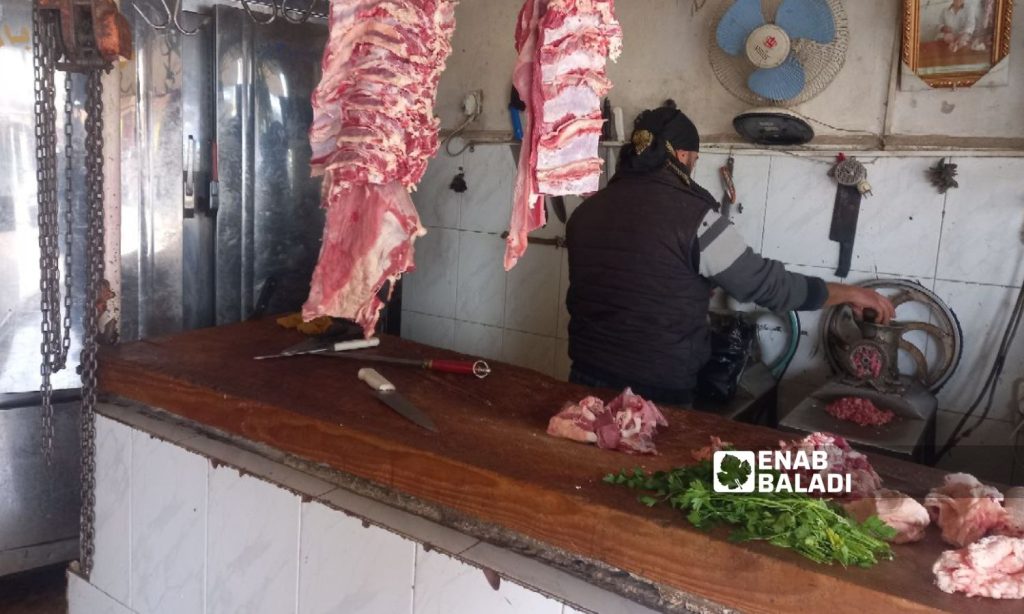Daraa – Halim Muhammad
The high price of red meat in the southern governorate of Daraa has forced livestock breeders to slaughter female sheep, goats, and cows due to their low price compared to the meat of males of the same species.
This dangerous phenomenon leads to serious damage that threatens livestock in the long run.
The meat of male livestock is preferred by meat consumers, in addition to being the most expensive in price. However, the high prices of male livestock in the local market in Daraa governorate prompted consumers to buy female meat.
Livestock depletion
During the years preceding the outbreak of the Syrian revolution, Daraa governorate was famous for being one of the areas that witnessed the most mass feasts, especially on social occasions, where meat is considered essential and one of the customs and traditions of the southern region.
Over time, the living situation in all of Syria deteriorated, as some people need to work a full day to secure basic needs, which makes meat a commodity that requires careful purchase.
Mahmoud, 32, breadwinner for a family of six, told Enab Baladi that the high price of meat pushes him to buy female meat, as it is less expensive than male lamb.
The price of a kilogram of lamb reached 75,000 Syrian pounds (about $10), and a kilogram of veal reached 60,000 Syrian pounds (about $8).
The prices of livestock meat vary between females and males, as the price of a kilo of live sheep recently reached 32,000 Syrian pounds, while the price of a kilo of live female sheep reached 24,000 Syrian pounds.
Mahmoud added that he prefers to buy the meat of female sheep, as it is the cheapest, and this does not mean that he buys it constantly, as it is difficult to obtain for him most of the time.
Mahmoud is trying to buy one kilogram of meat within two months, as he cannot raise the quantity more than that.
Mahmoud’s condition applies to many people in Daraa governorate, according to the testimonies of heads of families with whom Enab Baladi contacted, as they now prefer the meat of female livestock, as it is the cheapest.
Abdul-Aziz al-Maqali, head of the Consumer Protection Association in Damascus, previously told Sham FM Radio that the slaughter of female cows and goats threatens the extinction of livestock.
He pointed out that this behavior calls for “sounding the alarm, and the state’s intervention in exempting livestock breeders and feed importers from import duties and customs, and working to subsidize the farmers, who suffer high production costs.”
Demand increases
The demand for red meat and chicken meat increases, especially in Ramadan, as the demand for meat during the blessed month exacerbated the state of slaughtering female livestock in Daraa governorate, and the lack of rain and the lack of grazing for livestock increased this phenomenon.
Youssef, 38, a livestock trader, says that since mid-March, with the advent of Ramadan, he noticed an increase in demand, which merchants tried to compensate for through female sheep and cows, given that the rainy season was not sufficient this year.
In the absence of government oversight, many meat merchants went to buy female livestock to mix their meat with that of males and sell it as red ram meat for more profit. It has been common for years, but it has gotten worse lately.
Monopoly, smuggling
The rise in meat prices is due to several reasons, including the export and smuggling of sheep, as well as the fattening of sheep for the upcoming Eid al-Adha (when the sheep are slaughtered as a sacrifice), according to what Youssef told Enab Baladi.
He added that the most important factor in the increase in the demand for sheep is their monopoly by merchants during the month of Ramadan, with the aim of fattening them and selling them on the upcoming Eid al-Adha.
Moataz al-Sawah, head of the Sheep Breeders and Exporters Committee in the Federation of Chambers of Agriculture of the regime’s government, told al-Watan newspaper in March that the export of sheep “is suspended until the end of Ramadan,” since March is considered the birth period for livestock.
Al-Sawah added that the price of lamb meat is “irrational” in the local market, as it should not rise above 50,000 Syrian pounds per kilo.

